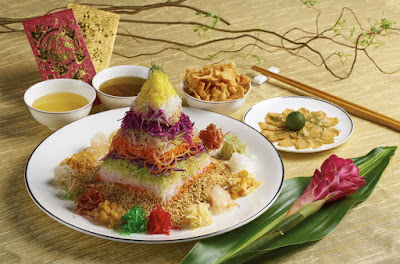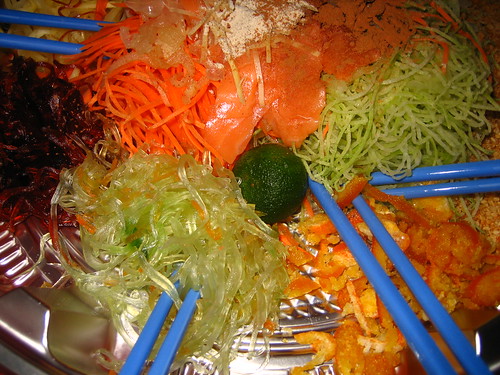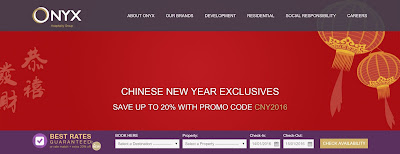 |
| Rabbits dominate in Chinese New Year decorations for 2023. Festive decorations in Chinatown, Singapore. The greeting in the foreground is 恭喜发财 (gong xi fa cai), 'congratulations on receiving
riches and prosperity'. |
The rabbit takes over from the ox as the 4th animal* in a 12-year
cycle in the Chinese zodiac in 2023. Chinese New Year begins January 22 in 2023, and auspicious language will be the norm from the first till the
15th day of the lunar new year.
 |
A wish for lots of business opportunities:
生意兴隆. |
Common greetings are 新年快乐 (xin nian kuai le), 'happy new year' and 恭喜发财 (gong xi fa cai), 'congratulations on receiving
riches and prosperity'. Riches are synonymous with success Chinese culture, and
especially so around
Chinese New Year. 心想事成 (xin xiang shi cheng), 'may
your wishes come true', and 福气满满 (fu qi man man), 'prosperity in
abundance', will be well received as well.
Fortune-related greetings in business settings include:
- 和气生财 (he qi sheng cai), 'wealth arising from harmony',
- 步步高升 (bu bu gao sheng), or 'rising higher with each step taken',
- 财源广进 (cai yuan
guang jin), or 'may riches enter in huge volumes', or 财源滚滚 (cai yuan gun gun), 'may riches gush in',
- 东成西就 (dong cheng xi jiu), or 'achievements everywhere, literally from east to west',
- 工作顺利 (gong zuo shun li), 'may your work go smoothly',
- 鸿运当头 (hong yun dang tou), 'may fortune find you',
- 货如轮转 (huo ru lun zhuan), 'may your products sell like hotcakes, as quickly as wheels turn',
- 马到成功 (ma dao
cheng gong), 'instant success' - particularly popular in the year of the horse as the word for horse (马) features in this saying,
- 年年有余 (nian nian you yu), 'surpluses every year',
- 平步青云 (ping bu qing yun), 'an easy path to a meteoric rise',
- 升官发财 (sheng guan fa cai) 'get a promotion and a raise',
- 生意兴隆 (sheng yi xing long), or 'may the business thrive significantly',
- 事业有成 (shi ye you cheng) 'success in business' , 事业发达 (shi ye fa da) 'a thriving business',
- 新年进步 (xin nian jin bu), which means 'making progress in the new year',
- 一本万利 (yi ben wan li), 'reap much more than you invest'.
Greetings
can also involve the animal for the year, such as filling in the blank
accordingly for ___年大吉 (___ nian da ji), 'great fortune in the year of
the ___', and ___年行大運/___年行大运, (___ nian xing da yun), 'great
luck in the year of the ___ as it progresses', depending on which
animal whose year it
is. You may also see ___ 来运转 (___ lai yun zhuan, or 'a change of fortunes when the animal arrives'). Referring to the animal of the year as 福___ (fu ___), or 'the fortune-bringing ___' is also common. It
is the year of the rabbit (兔, tu) this year, of the dragon (龙, long) after that, and then the year of the snake (
蛇, she).
 |
Coca Cola, the company, is running Chinese New Year campaigns for 2023 with several different messages. Here it is 玉兔送福 (yv tu song fu), 'the jade rabbit* delivers fortune', echoing the wishes in English.
|
Puns
are common in Chinese when many words sound the same, and brands may
pun on positive classical Chinese sayings in their festive marketing**
as a result. While rabbit-related sayings are relatively negative, and a number of phrases with negative connotations as homonyms (think 糊涂 [hu tu], 'clumsy', and 吞吞吐吐 [tun tun tu tu], 'stutter'), many marketers have nevertheless found connections that make sense:
- 钱兔似锦 (qian tu si jin), 'the money rabbit has a future as bright as brocade', is a play on 前程似锦 (qian cheng si jin), 'the future is as bright as brocade'.
- 兔飞猛进 (tu fei meng jin) sounds exactly like 突飞猛进, 'to progress and grow in leaps and bounds', but would mean 'the rabbit has flown in with great fanfare'.
- Similarly 扬眉兔气 (yang mei tu qi) or 'to raise the eyebrows in a rabbit-related atmosphere', makes little sense without the context that the greeting sounds exactly like 扬眉吐气 (yang mei tu qi), 'to feel pride and happiness after completing a difficult task'.
- 兔显神通 (tu xian shen tong), 'to be superpowered with the rabbit', requires the context that 大显神通 (da xian shen tong) means 'to be superpowered'.
- 兔然暴富 (tu ran bao fu), 'get rich with the rabbit', is a play on 突然暴富 (tu ran bao fu), 'to suddenly get rich'. The original saying is 一夜暴富 (yi ye bao fu), or 'to get rich overnight'.
- 大展宏图, sometimes 大展鸿图 (da zhan hong tu) and also reversed as 宏图大展, sometimes 鸿图大展 (hong tu da zhan), meaning 'to unveil or embark on grand plans', can be revised to 大展宏兔 (da zhan hong tu), 'the grand rabbit has been unveiled', or 'to embark on the great year of the rabbit'.
 |
Selection of food packaging from Shein. Clockwise from top left: 兔来运转 (tu lai yun zhuan),钱兔似锦 (qian tu shi jin),扬眉兔气 (yang mei tu qi), 兔飞猛进 (tu fei meng jin).
|
 |
Bossini's Chinese New Year decor says 金兔报喜 (jin tu bao xi), 'the gold rabbit announces happiness'.
|
 |
Magiclean's Chinese New Year marketing says 兔显神通 (tu xian shen tong).
|
 |
Giordano has gone for 兔气扬眉 (tu qi yang mei), a variant of 扬眉吐气 (yang mei tu qi).
|
 |
Coca Cola's Chinese New Year message for Coca Cola: 可口可乐, 扬眉兔气 (ke kou ke le, yang mei tu qi) can be taken to mean 'delicious and inducing happiness, be proud and happy in the year of the rabbit'.
|
No traditional
Chinese New Year banquet in Malaysia and Singapore
is complete without a lohei (撈起) ceremony before the meal proper.
Loheis are available weeks before
Chinese New Year, and up to the
15th day of the new year.
 |
| A lohei platter. Each ingredient has an auspicious meaning, including the raw salmon (abundance) in the middle,
and the crackers (money). |
A platter of yusheng (鱼生), a raw fish*** salad, is first brought to the
table after which toppings are ceremoniously added individually,
accompanied by
auspicious wishes that accompany specific ingredients. The sweet sauce is typically added while saying 甜甜蜜蜜
(tiantian mimi, a wish that life will be sweet) and the fish or seafood
component arranged on the salad while saying 年年有余 because 余 (yu, 'surplus'), sounds like 鱼 (yu, 'fish').
Once complete, diners toss (lo) the salad with chopsticks while calling
out their wishes for the coming year - just use the ones mentioned above. The higher the salad is raised
(hei), the
better the luck for the coming year.
If
you can't remember too many greetings, don't worry - a simple 'happy
new year' is fine. The whole idea is to start off the year right, and
it's traditional to hope for fortune, prosperity and success. Just stay
away from anything negative. 万事如意 (wan shi ru yi), 'may all things be as
you wish'!
Explore:
Fengshui masters typically release forecasts for a new year before
Chinese New Year as well. Dato' Joey Yap of The Joey Yap Group and founder of the Mastery Academy of Chinese Metaphysics has released forecasts for different animal signs in 2023, as well as an
overview video, where Yap explains who will be the wizards, warriors and healers of the year.
Hashtags: #CNY, #ChineseNewYear, #JoeyYap, #12Animals, #YearOfTheWaterRabbit, #LunarNewYear, #SpringFestival, #ChineseMetaphysics
*The
sequence, according to legend, came down to which 12 animals arrived
first in a race to be included in the zodiac. The animals crossed the
finishing line in the sequence of rat, ox or cow, tiger, rabbit, dragon,
snake, horse, goat or sheep, monkey, rooster, dog and pig. What
everyone also seems to agree on is that the rat took advantage of the
ox. It was actually in second place, but jumped off the ox's back to get
to the finish line first. The rabbit is also known as the jade rabbit due to a second legend, in which it offered itself as food to a hungry man. The man turned out to be the Jade Emperor in disguise, and as a reward the rabbit became immortal and was sent to the moon to live forever.
**2019
featured very few puns on pigs in
Singapore, and 2020 was the same as the rat is often depicted negatively
in classical Chinese phrases. 2021 continued with this trend with
just one phrase, 扭转乾坤 (niu zhuan qian kun) or 'a complete change' used,
with the word 扭 replaced with the homonym 牛. The year of the tiger was
the same, with words that sounded like 虎 being replaced. One brand, UFC,
changed 五福临门 (wufu linmen), 'may the five fortunes come to your door',
to 虎福临门 (hufu linmen) - 'may the fortune of the tiger come to your
door', for instance.
For 2018, the year of the dog, the word 旺 (wang), which has connotations of abundance and prosperity, was
common in
festive decor as it sounds similar to the sound a dog makes, 汪 (wang).
In 2017, the year of the chicken (鸡, ji), drinks manufacturer Pokka
wished
everyone 吉祥如意 (ji xiang ru yi) - all the happiness and prosperity that
you hope for, but replacing 吉 with 鸡, and 祥 with 翔 (xiang), which means
to 'soar' in keeping with the avian
theme.
2015 was the year of the goat (or sheep), and there are a few festive
greetings that take advantage of how the word for goat, 羊 (yang), is a
homonym found in various Chinese idioms. 阳光灿烂 (yang guang can lan) is a
wish for bright sunlight or a bright future; 喜气洋洋, converted to 喜气羊羊
(xi qi yang yang) for the year, refers to happiness everywhere; while
羊羊得意, really 洋洋得意 (yang yang de yi), is a wish that the recipient will
get whatever he or she wants, in the best way possible.
马到成功 is especially apt in the year of the horse in 2014, as the
character for horse, 马, begins the greeting, but it can be used at any
other time as well.
***Various
chefs have experimented with different takes on the salad. The raw fish
component has been replaced by Wagyu beef slices, smoked salmon, sliced abalone or lobster
for example, while the salad may be replaced by fruit. Fancier toppings
such as gold flakes or caviar have also appeared in recent years.

























